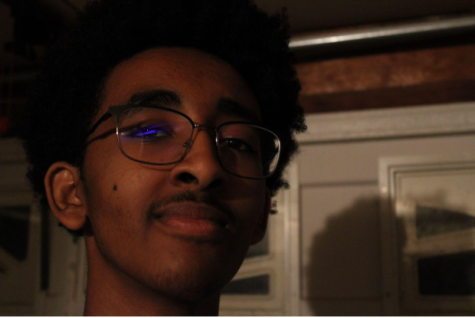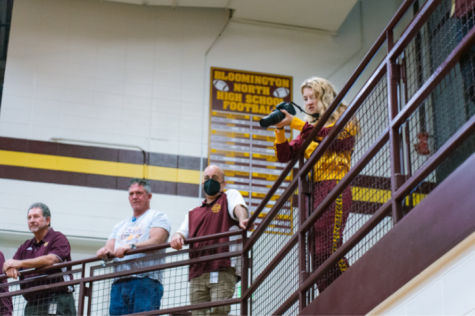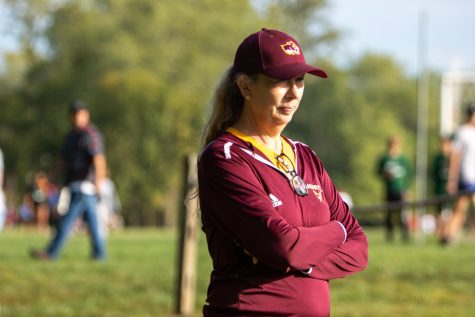The New Netflix Must-See
Last month, fittingly with the upcoming holiday, Netflix released their latest original show. This latest Netflix production, a British comedy-drama simply named Sex Education, brings a slightly taboo topic to the table: teen sex.
The topic of sex in high school is fairly prevalent for several different reasons. In the United States, many people start having sex toward the end of high school, with the average age falling at 17 for females and 18 for males. These numbers have actually been rising over the last two decades; within the last 20 years the percentage of teenagers who say they have had sex in high school has fallen below 50 percent.
Despite this statistic, the negative connotations that surround teen sex are still fairly prevalent in our culture. Fear of pregnancy and sexually transmitted infections is, in part, the reason why so many schools still feature an abstinence only health curriculum.
Unlike what is present in many high school health classes across the country, Sex Education brings a more comprehensive approach to the topic of sex to the table. The show, while still presenting an exaggerated and glorified version of the high school experiences, manages to communicate more accepting and open views surrounding teen sex while squeezing in a little bit of actual education on the topic.
It’s very stereotypical, but it’s kind of relatable in comparison to american teen shows except it kind of erases the stigma of having sex and I think that’s important,” anonymous North student A said. A lot of people, they’re uncomfortable with it. A lot of American sex education is very conservative and a lot of people don’t know how to approach things when it comes time to face them. I think the show really educates you and shows real circumstances.”
While the sex education that is taught in many American high schools pushes abstinence and uses horrid depictions of diseases to discourage the idea of engaging in sexual activities, Sex Education the TV show brings an open discussion to the table through a story line that centers around two high schoolers starting their own sex therapy clinic for the students at their school.
“I think the show does a really good job of kind of breaking down the stigma,” anonymous North student B said. “That really goes to break down the wall and make sex a central character in the show, but not necessarily one that is looked at in the same way it would be in an American made tv show.”
While it is true that the cultural connotations surrounding sex are different depending on where you are in the world, Sex Education promotes a pretty universal message of comprehensive education, inclusivity, and openness.
One of the most important reasons the show stands out, according to North students, is because it portrays having sex in high school in a more realistic light than TV shows marketed to teenagers sometimes do.
“There [are] a lot of unrealistic expectations that come from those TV shows and it’s not very comparable to real life situations,” student B said. “I think what Sex Education does is it really kind of opens the characters up to vulnerability and shows a lot of different situations.”
“What Sex Education does is it has a lot of sex in it, obviously, but it does show a lot of different kinds of sex and different struggles that people have,” student A said. “I think a lot of times when sex is shown in the media it’s shown as something that’s a very idealized form of it. Especially with high schoolers, that’s not probably what it’s going to be. I think that showing people that are having different kinds of problems, whether it’s personal issues or things with their partner, I think that’s something that’s a really powerful thing to show.”
Sex Education displays teen sex as it probably will be: messy and sort of awkward. The show displays all sides of this, showing both the positives and negatives that come with engaging in sexual acts at such a young age. According to North students, a lot of the repercussions of sex have to do with the emotional fallout of the experience or relationship, something that is a central part of the show.
“Showing that there is more to sex than just physical context, that’s really good,” student B said. “I feel like in America sex is just stigmatized as physical but in Sex Education it shows emotional connection and relationship connection and trying to connect with yourself. It’s not just about physicality, it’s about knowing who you are.”
Knowing who you are, according to some North students, is an important factor in deciding when is the right time to start having sex.
“Sex is a very individualized experience,” student B said. “You should [have sex] when you feel you’re ready and when you feel comfortable doing that with someone.”
Apart from promoting positive attitudes surrounding teen sex, these students feel the show also promotes a culture of comprehensive education, which they think is important in a school environment. Not everyone learns about sex from their families, meaning high school health class and media platforms are the main sources of information for many people. That’s why these students think that comprehensive education should be present in both schools and in media representation.
“In general, sex that’s shown in the media, while I think it is skewed and it’s not always a healthy presentation or representation of sex, it’s important that its there,” student A said. “I think that for a lot of people that’s their primary way that they find out about sex. If that wasn’t there then they would know nothing, which I think is even more dangerous than knowing something that might be a little bit wrong.”
While still a stereotypical teenage show, Sex Education seems to accomplish a more genuine and accurate representation of having sex in high school than many other shows of its kind. No matter who you are, it is a must-watch.











